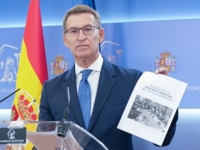Politics
The winner of the legislative elections in July offers a two-year legislature
And six pacts to regenerate Spain
USPA NEWS -
The acting President of the Spanish Government, the socialist Pedro Sánchez, and the winner of the legislative elections that were held on July 23, the conservative Alberto Núñez Feijóo, met this Wednesday in Madrid at the initiative of the latter, to bring closer positions and agree on a government model that avoids new concessions to the independence parties of Catalonia and the Basque Country – two of the most important regions in Spain – and returns centrality and alternation in power to Spanish politics.
Less than a month before the investiture debate that will be held in Parliament, in which the conservative Alberto Núñez Feijóo will appear, who was proposed by King Felipe VI as the winner of the legislative elections, the candidate does not have enough support to be elected. Neither does the current Prime Minister, Pedro Sánchez, who could attempt the investiture if his rival fails in the debate that will be held on September 26 and 27. Sánchez has on his office table the demands that the Catalan pro-independence parties have put forward to him to give him their support: a self-determination referendum and amnesty for all pro-independence politicians convicted for the 2017 secession attempt. Demands that are difficult to meet, especially in regarding the referendum, which would require a constitutional reform impossible in the current circumstances because the conservative Popular Party has an absolute majority in the Senate.
The outlook that is anticipated is one of absolute ungovernability that would force a repeat of the legislative elections on January 14. It is the option contemplated by the Spanish Constitution in the event that on November 27 there is no Government constituted in Spain. With that perspective, Núñez Feijóo this Wednesday asked the acting Prime Minister for an agreement “for the sake of centrality” so that “the list with the most votes can govern in our country, as has been customary for the last 45 years.” The conservative candidate believes that, “in this way, the influence that the pro-independence parties claim to have would be deactivated and Spain could guarantee equal treatment of Spaniards.”
Núñez Feijóo asked the acting Prime Minister and general secretary of the Socialist Party, Pedro Sánchez, for his support to be named president of the Government and in exchange offered six pacts for a legislature that, as promised, would last two years. After that time, he would call legislative elections in search of a clear majority that would allow conservatives or socialists to govern, without the pressure of peripheral parties seeking to break up Spain. The alternative, he said, is a repeat of the elections in four months.
As he explained, his Government would have 15 ministries, seven less than the current Government in office, and he promised to “defend the territorial integrity of the Spanish Nation,” rejecting requests for an independence referendum and amnesty. The six pacts that he offered to the socialists seek democratic regeneration, guarantee the viability of the National Health System and the sanitation of the State accounts, which would have a direct impact on the sustainability of the Pension System, the quality of education and the end of the political confrontation between blocks that in recent years has awakened the specter of the Civil War.
The Socialist response to the Popular Party's proposals was immediate: a resounding "no" promoted by Prime Minister Pedro Sánchez and his obsession with continuing in office. "He prefers to agree with the independentists," lamented the conservatives, who consider the defeat of their candidate in the first vote of the investiture debate as certain, since they do not have sufficient support. In the second, the abstention of the Basque Nationalist Party would It'd be enough.
Liability for this article lies with the author, who also holds the copyright. Editorial content from USPA may be quoted on other websites as long as the quote comprises no more than 5% of the entire text, is marked as such and the source is named (via hyperlink).






